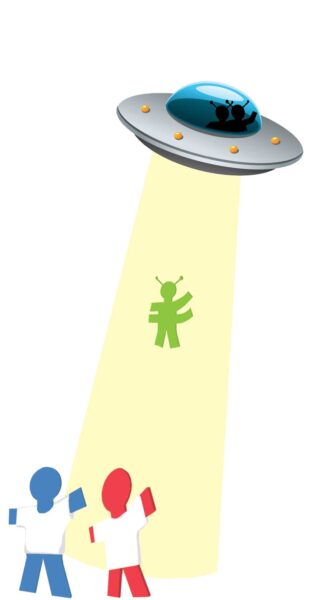The author reflects on the results of Denver’s recent E.T. commission election.

Since I wrote the column in last November’s issue (page 20) about Denver’s Extraterrestrial Affairs Ballot Initiative, several readers have asked me what happened. The result was mixed. The measure did not pass, which helps restore my faith that an educated populace can collectively make good decisions, including rejecting the notions that secret alien technology is here on Earth and that urgent diplomatic measures are required of city governments to prepare for imminent alien contact.
On the other hand, it received 31,108 votes, or 18%. What were those people thinking?
Maybe some of them didn’t actually read the full ballot initiative, but felt that it’s about time that we take a less provincial view of our existence in the vastness of the cosmos. Fair enough. And surely some were amused by that goofy initiative, which seemed like a joke at the end of the ballot. It was actually quite a relief after voting for numerous national and state offices, complex tax measures, and constitutional amendments, to find a final ordinance requiring “…the creation of an extraterrestrial affairs commission to help ensure the health, safety, and cultural awareness of Denver residents and visitors in relation to potential encounters or interactions with extraterrestrial intelligent beings or their vehicles…” An alien commission? Rock on!
But one has to assume that a significant portion of the 18% knew what they were voting for and chose it anyway. What’s wrong with that?
I don’t find it impossible that intelligent extraterres-trials could travel to Earth. And I can easily imagine the possibility of long-lived intelligences with unpredictable intentions, behavior, or capabilities. Signs of contact, especially unintentional on their part, might seem very strange and difficult for humans to interpret. Certainly we should explore our solar system and remotely probe others, and we should remain on the lookout for alien artifacts and engineering.
So I try to keep an open mind. But whatever you think about the existence of intelligent extraterrestrials, it’s also quite plausible that we haven’t been visited, and most of what has been cited as evidence is the result of wishful thinking. We have to be wary of our biases here.
I have seen several things in the sky that I cannot explain. My interpretation of these sightings is not that I have witnessed alien activities. I don’t have proof that reinforces this impression. I have a high level of confidence in my scientific intuition even while I recognize that it’s not an infallible guide.
I have attended meetings of UFO enthusiasts, and I often agree with their opening statements, which usually involve an assertion of the immensity of the universe and the absurdity of positing that we are alone in this vastness. But they lose me when they start describing their evidence, which is often highly anecdotal or subject to less-exotic interpretations. The proponents of alien encounters very much want to believe. I think most of us do. Personally, I would love it if some wise aliens would show up and tell us the secret to long-term global survival with advanced, planet-changing technology. I feel the lure of belief in my mind and heart, and I want to see as clearly as I can through that reality distortion field. Maybe we all want to believe, but for some of us that makes it harder, not easier.
This article originally appeared in print in the July 2011 issue of Sky & Telescope. Subscribe to Sky & Telescope.
 0
0
Comments
You must be logged in to post a comment.